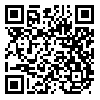Volume 12, Issue 5 (Sep & Oct 2022)
J Research Health 2022, 12(5): 347-354 |
Back to browse issues page
Download citation:
BibTeX | RIS | EndNote | Medlars | ProCite | Reference Manager | RefWorks
Send citation to:



BibTeX | RIS | EndNote | Medlars | ProCite | Reference Manager | RefWorks
Send citation to:
Izadi F, Farokhzad P. Predicting the Risk of COVID-19 Among Healthcare Staff Based on the Components of Depression and Death Anxiety. J Research Health 2022; 12 (5) :347-354
URL: http://jrh.gmu.ac.ir/article-1-2092-en.html
URL: http://jrh.gmu.ac.ir/article-1-2092-en.html
1- Department of Psychology, Roudehen Branch, Islamic Azad University, Roudehen, Iran.
2- Department of Psychology, Roudehen Branch, Islamic Azad University, Roudehen, Iran ,dr.pegahfarokzad@gmail.com
2- Department of Psychology, Roudehen Branch, Islamic Azad University, Roudehen, Iran ,
Abstract: (1694 Views)
Background: Physicians’ and nurses’ experience of the COVID-19 pandemic and its physical and psychological consequences can be associated with changes in biological and hormonal levels experienced as fatigue, restlessness, disruptions in one’s mood, and sleep quality. This study examined the role of depression and death anxiety in contracting COVID-19 among healthcare staff.
Methods: The statistical population of this descriptive correlational research comprised nurses and nurse assistants working in Tehran (Iran) hospitals from the summer to winter of 2021. A sample of 156 was selected to fill out a demographic information form, Templer’s death anxiety scale, and Beck’s depression inventory. The data were analyzed in SPSS software, version 25.0 using logistic regression analysis.
Results: The model based on three predictors of depression (cognitive, affective, and physical components) led to a significantly better prediction compared to the fixed-effects model (P<0.001). The affective component of depression was a more powerful predictor of the risk of COVID-19 than the other two components. The model based on three predictors of death anxiety (absolute death anxiety, fear of pain and surgery, and the general factor) also led to a significantly better prediction compared to the fixed-effects model (P<0.001). All three components of death anxiety were statistically significant predictors of COVID-19 risk
Conclusion: Consequently, depression and death anxiety seem to predict and explain the risk of COVID-19 in healthcare staff by altering cognitive, affective, and physical conditions.
Methods: The statistical population of this descriptive correlational research comprised nurses and nurse assistants working in Tehran (Iran) hospitals from the summer to winter of 2021. A sample of 156 was selected to fill out a demographic information form, Templer’s death anxiety scale, and Beck’s depression inventory. The data were analyzed in SPSS software, version 25.0 using logistic regression analysis.
Results: The model based on three predictors of depression (cognitive, affective, and physical components) led to a significantly better prediction compared to the fixed-effects model (P<0.001). The affective component of depression was a more powerful predictor of the risk of COVID-19 than the other two components. The model based on three predictors of death anxiety (absolute death anxiety, fear of pain and surgery, and the general factor) also led to a significantly better prediction compared to the fixed-effects model (P<0.001). All three components of death anxiety were statistically significant predictors of COVID-19 risk
Conclusion: Consequently, depression and death anxiety seem to predict and explain the risk of COVID-19 in healthcare staff by altering cognitive, affective, and physical conditions.
Type of Study: Orginal Article |
Subject:
● International Health
Received: 2022/06/6 | Accepted: 2022/07/27 | Published: 2022/08/6
Received: 2022/06/6 | Accepted: 2022/07/27 | Published: 2022/08/6
| Rights and permissions | |
 |
This work is licensed under a Creative Commons Attribution-NonCommercial 4.0 International License. |









